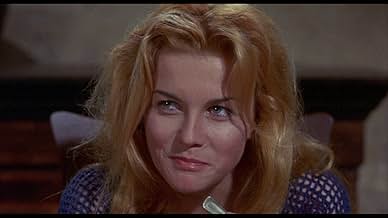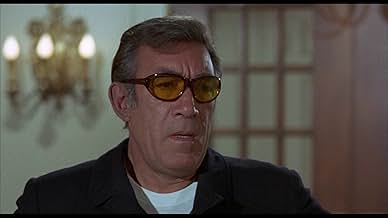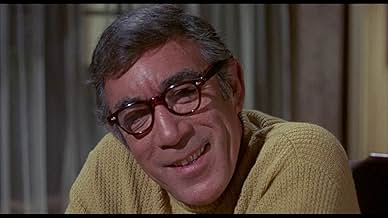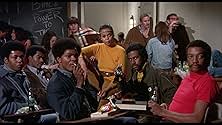R.P.M. stands for (political) revolutions per minute. Anthony Quinn plays a liberal college professor at a west coast college during the heady days of campus activism in the late 1960's. Rad... Read allR.P.M. stands for (political) revolutions per minute. Anthony Quinn plays a liberal college professor at a west coast college during the heady days of campus activism in the late 1960's. Radical students take over the college, the president resigns, and Quinn's character, who has... Read allR.P.M. stands for (political) revolutions per minute. Anthony Quinn plays a liberal college professor at a west coast college during the heady days of campus activism in the late 1960's. Radical students take over the college, the president resigns, and Quinn's character, who has always been a champion of student activism, is appointed president.
- Estella
- (as Ines Pedroza)
- Director
- Writer
- All cast & crew
- Production, box office & more at IMDbPro
Featured reviews
Leader of a student group taking over a university's computer center, Lockwood... along with another thirty-something student Paul Winfield... have demands they give to a liberal professor they once really liked...
That's where star Anthony Quinn, hired as a kind of emergency dean/president, comes in: spending most of the picture either having long discussions with comparably stuffy and conservative university profs or hanging out with young girlfriend Ann-Margret, who, like Lockwood, has little to do here but spout smug counter-culture platitudes in what feels more like a progressive TV-movie than a watered-down big-screen expose of college revolutionaries (very timely here in 2024), hence the R. P. M. Title standing for Revolutions Per Minute...
But there's only one revolution here, and it drags, despite Lockwood having a few good monologues opening up to Quinn... yet the audience can never fully get into his shared plight/agenda since otherwise sympathetic left-wing director and scriptwriter Stanley Kramer and Erich Segal never properly flesh-out the characters to grow past clichés - on either side of the aisle.
Anthony Quinn gives one of his finest "latter" years roles as F.W.J. "Paco" Perez. Quinn's character is a liberal fighting, social changing sociology professor who has earned the respect of the rebellious student population at his university. The students want changes now, but are unwilling to compromise. Stanley Kramer shows that there were "no easy" solutions to the various generational problems for the times. Ann-Margret is in her "sexiest" prime, but also shines as a Perez "grupie". Also, Gary Lockwood as the militant student leader gives a creditable performance.
Revolutions Per Minute is a great trip down memory lane and helps capture the atmosphere of 1970.
In a conversation on the stairwell toward the end of the film, Anthony Quinn and Gary Lockwood discuss change, indicating that nothing happened between Quinn's and Lockwood's respective generations. Nothing has happened in the two generations that followed, i.e. 1990 and 2010.
The sad fact is that society has degenerated. I graduated from a very liberal Big Ten school in 1962 and we didn't have campus unrest. After that, I began a successful career which was interrupted by the draft and a tour in Vietnam. I returned to work and became even more successful because I worked smart and hard. The draft saved me and I wish the draft would have never ended, although I think the Vietnam war was futile. Young men need military service to GROW UP! As for Ann Margaret, she always played sexy but never nude, except for her role in 'Carnal Knowledge' where viewers experienced her large arse.
Despite Ann's frivolous on-screen characters (I wonder how she was in private life) this was a film that predicts the future, as in...'Oh yah, life goes on, long after the thrill of living is gone.' (John Mellancamp).
Anthony Quinn is a popular sociology professor of Hispanic heritage and has something of a following among the radical left on campus. When President John Zaremba just resigns in frustration because he can't deal with a bunch of students occupying the campus administration building. Quinn also has a student mistress in the person of Ann-Margret a rather open secret on campus.
The Board of Trustees decide on what they consider a master stroke, make the popular Quinn the new president because they think he can talk the radical talk and make them walk. It doesn't quite work out that way as Quinn all too well realizes that he's now part of the 'establishment'.
The students who are all too old to be playing campus radicals include spokesperson Gary Lockwood and black student leader Paul Winfield. Fine players but all showing their age. Ann-Margret is a graduate student, but even she looks a bit old to be college coed.
It ends in a scene that was all too familiar in the Sixties, police raiding the school and making arrests. At some point the students have to get back to the business of education.
Fascinating that the big threat they had was to destroy the giant computer that the college had if they didn't get their way. Now Bill Gates and the late Steve Jobs would have a fainting spell dare they suggest such a thing.
R.P.M. marked the beginning of when director Stanley Kramer started to lose his muse. It is truly truly dated.
But here's the insulting part of the film, why dear vibrant, sexy Tony should never have taken the part: he's shown as over-the-hill and unable to relate to the wild generation. He wears reading glasses, he takes terrible insults from the students, and his girlfriend tells him "Pull in your gut" when he walks around naked. (Sorry ladies, he's given a flesh-colored thong to protect his modesty.) One could argue that he's still young and hip enough to go to bed with Ann-Margret, but as the movie progresses, the students are so disrespectful, they show the real generation gap: manners and decency. Even though Tony doesn't agree with the kids, he still tries to treat them with respect, but the angry, protesting teenagers don't give him the same courtesy.
There will be a large chunk of audience members who side with the teenagers, and that makes me both sad and disgusted. Manners never go out of style, and using them doesn't show weakness or inflexibility. It shows class, the ability to see the bigger picture, and maturity. Tony may belong to the older generation with graying hair and a growing tummy, but I'll happily join him any day of the week.
Did you know
- TriviaStanley Kramer always referred to this film in interviews as his least favorite and least successful of the films he has directed.
- Quotes
Prof. F.W.J. 'Paco' Perez: "Lickety split"? Where do you get your vocabulary?
- Crazy creditsAs the opening credits roll, the screen flips like a coin-like wipe with the text appearing in the center of the "coin".
- ConnectionsFeatured in Two Sides of the Coin: The Songs and Music of 'R.P.M.' (2019)
- SoundtracksStop! I Don't Wanna' Hear It Anymore
Written by Barry De Vorzon & Perry Botkin Jr.
Additional lyrics by Melanie
Performed by Melanie
Courtesy of Buddah Records
- How long is R.P.M.?Powered by Alexa
Details
- Release date
- Country of origin
- Language
- Also known as
- R.P.M. */* Revolutions per minute
- Filming locations
- Pacific Avenue Bowl, Stockton, CA, USA(Exterior)
- Production company
- See more company credits at IMDbPro
- Runtime
- 1h 32m(92 min)
- Sound mix
- Aspect ratio
- 1.85 : 1






























